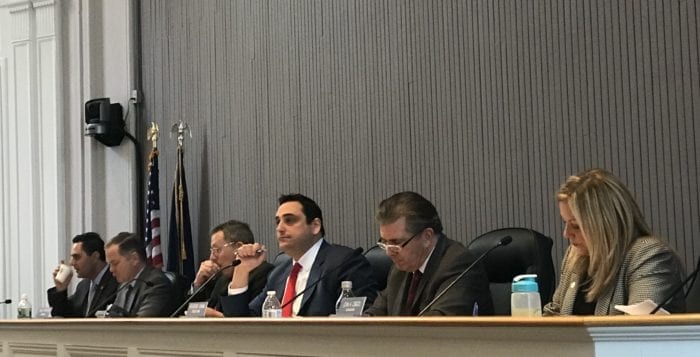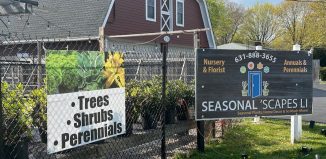Huntington revising accessory apartment rules
Many Huntington residents rely on income from accessory apartments to help offset high property taxes. The Town of Huntington has proposed legislation that would change rental rules. In some cases, the new rules are more lenient, making it easier for people to rent space in their home. But the proposals also include a ban on basement apartments, unless a valid dwelling unit permit already exists.
The fate of these accessory apartments has proved to be a contentious issue and residents have been debating the pros and cons of such a change in May and June at two town board meetings.
“This could create cramped and unsafe living conditions.”
— Hector Gavilla
At a May 30 public hearing, a change in local zoning law was discussed and would reduce the lot size requirement for accessory apartments from 7,500 square feet to 5,000. The frontage requirement for an apartment would change from 75 feet to 50 feet.
Hector Gavilla, a real estate broker in the town for the past 16 years, spoke at the hearing and sent a letter stating that high property taxes are the real problem that needs to be addressed. He also said it is a false narrative to tell people that these changes in the law will lower the rates for apartment rentals. He argued that the changes in law could harm more people than it would help.
“[The proposal] this will allow too many people to occupy much smaller dwellings,” he said. “This could create cramped and unsafe living conditions.”
Town records show that the town unanimously approved a resolution to ban basement apartments without a valid permit.
At a June town board meeting, a proposal to ban all basement and cellar apartments, unless a valid permit already exists or is pending with an already-filed application, was put on the table as well as changes to short-term rental rules. Some residents argued that the ban would negatively impact lower-income homeowners. Others said basement apartments are a safety concern and potentially hazardous, because the space is prone to mold and carbon monoxide leaks.
Huntington resident Dale Gifford said she is in favor of the ban on basement apartments in the town.
“Expert environmentalists have come from out of town to lend their voices to educate the public and the board on the damages caused by overdevelopment and overcrowding,” she said. “Nitrate seeps through the soil from stressed cesspools and gets picked up by the heavy rain.”
John Esposito had similar sentiments on the legislation, stating that it is a no-brainer. Accessory apartments, he said, can be especially hazardous to EMT and emergency response workers due to possible carbon monoxide issues that can occur in basements.
“This a step in the right direction. Myself and others object to the overdevelopment, zoning of multiple apartment units and the apartments behind Stop and Shop,” he said. “This will give us a better quality of life [in the town].”
Conrad Ege, a Huntington resident, opposed the legislation, saying it was too much of a financial burden.
“It would make it harder for them to pay some lines of credit, to pay taxes, to pay for other improvements that are necessary on their home and it would just make it more difficult for them to live here,” he said.
Despite being opposed to the accessory apartment ban, Ege said he supports the legislation that would put limitations on short-term rentals in the town.
Roger Weaving Jr., president of the Huntington Township Housing Coalition, stated he is in favor of the bill, but asked the board to clarify what they meant by accessory dwelling units. Certain style homes, such as high ranches, could cause some confusion. He stressed that high ranches should be able to continue to have accessory dwellings.
We are here with concerns and the town is simply putting Band-aids on our problems. The change to 90 days is a start, but we really have a way to go.”
— Justine Aaronson
With the popularity of Airbnb, residents have complained that these short-term rentals have negatively impacted their quality of life. In April, the town board voted to reduce the number of days that a homeowner can engage in short-term rental agreements from 120 days a year to 90 days. Some residents said that the limit is not enough. Justine Aaronson, a Dix Hills resident, complained that accessory apartments affect quality of life. She told the town board of an incident where a stranger’s car with out-of-state plates was parked on their driveway around midnight. Concerned, she called the police and later found out that the individual was staying in a neighbor’s rental unit.
“I want the Town of Huntington to protect the quality of life in residential communities,” she said. “We are here with concerns and the town is simply putting Band-aids on our problems. The change to 90 days is a start, but we really have a way to go.”
“We’re talking about a win-win-win situation with these amendments as they will make it possible for our older residents to age in place, allow our younger residents to attain the dream of homeownership, all while giving the town a means by which to directly regulate, in many cases, previously illegal rental housing,” said Councilwoman Joan Cergol. “My prior sixteen years in Huntington Town government specializing in economic and community development have deeply sensitized me to the very real financial challenges and housing needs our residents face every day. I’m so gratified to be in a position to answer this call.”
The next public hearing is scheduled for July 16 at 2 p.m.







